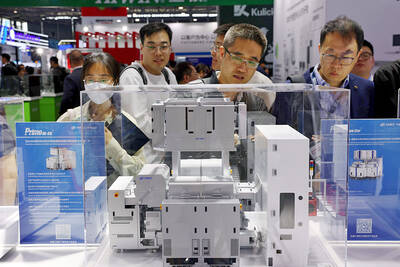BMW AG rarely has to answer this question in Western showrooms, but it is becoming increasingly important for selling cars in China: Can I sing karaoke in this automobile?
Customers in the world’s largest auto market are demanding that sing-along apps such as Changba (唱吧) work in new vehicles. Local manufacturers XPeng Inc (小鵬), Nio Inc (蔚來) and BYD Co (比亞迪) are at the forefront of this trend, besting Western rivals by offering models with karaoke microphones.
The push extends beyond music, with Chinese buyers expecting seamless access to features like in-car payment and social media connectivity.
“We’ve identified this as a challenge,” BMW’s digital car chief Christoph Grote said. “Chinese consumers are the most demanding when it comes to digital technology in the car.”
Tapping into local tastes is crucial to win over customers in China, where electric-car adoption is accelerating and homegrown auto offerings are mushrooming. The country is the biggest market for BMW as well as Volkswagen AG, accounting for 36 percent and 40 percent of sales, respectively.
Local brands are trying hard to win over the digital-native crowd. Zhejiang Geely Holding Group Co (浙江吉利控股) earlier this year started Zeekr, an all-electric marque aimed at millennials, and automakers are using local influencers to tout their models as online buying becomes more widespread.
Western manufacturers are lagging behind integrating Chinese digital ecosystems into their cars, according to Kearney. More than two-thirds of local consumers view Chinese navigation apps as a must-have feature, and Western brands risk falling behind in the “everything-connected” era, the consultancy said in a report last year.
While Western automakers have viewed digital connectivity as a feature for which they can charge extra to customers, its Chinese rivals are using it as an enabler to integrate third-party services, said Bill Russo, chief executive officer of Automobility Ltd, a Shanghai-based consultancy.
“Such digital services are dominated by local ecosystem players in China, and multinationals often lack the deep local collaborations needed to generate revenue from these services,” Russo said.
BMW does not yet offer karaoke features in its cars, but has worked with Tencent Holdings Ltd (騰訊) to integrate a function to pay parking fees via the popular WeChat Pay app.
The company plans to use a joint venture formed last year with Nanjing-based Archermind Technology Nanjing Co (誠邁科技) to expand its connectivity features and is open to other partnerships, Grote said.

SEMICONDUCTOR SERVICES: A company executive said that Taiwanese firms must think about how to participate in global supply chains and lift their competitiveness Taiwan Semiconductor Manufacturing Co (TSMC, 台積電) yesterday said it expects to launch its first multifunctional service center in Pingtung County in the middle of 2027, in a bid to foster a resilient high-tech facility construction ecosystem. TSMC broached the idea of creating a center two or three years ago when it started building new manufacturing capacity in the US and Japan, the company said. The center, dubbed an “ecosystem park,” would assist local manufacturing facility construction partners to upgrade their capabilities and secure more deals from other global chipmakers such as Intel Corp, Micron Technology Inc and Infineon Technologies AG, TSMC said. It

EXPORT GROWTH: The AI boom has shortened chip cycles to just one year, putting pressure on chipmakers to accelerate development and expand packaging capacity Developing a localized supply chain for advanced packaging equipment is critical for keeping pace with customers’ increasingly shrinking time-to-market cycles for new artificial intelligence (AI) chips, Taiwan Semiconductor Manufacturing Co (TSMC, 台積電) said yesterday. Spurred on by the AI revolution, customers are accelerating product upgrades to nearly every year, compared with the two to three-year development cadence in the past, TSMC vice president of advanced packaging technology and service Jun He (何軍) said at a 3D IC Global Summit organized by SEMI in Taipei. These shortened cycles put heavy pressure on chipmakers, as the entire process — from chip design to mass

Germany is to establish its first-ever national pavilion at Semicon Taiwan, which starts tomorrow in Taipei, as the country looks to raise its profile and deepen semiconductor ties with Taiwan as global chip demand accelerates. Martin Mayer, a semiconductor investment expert at Germany Trade & Invest (GTAI), Germany’s international economic promotion agency, said before leaving for Taiwan that the nation is a crucial partner in developing Germany’s semiconductor ecosystem. Germany’s debut at the international semiconductor exhibition in Taipei aims to “show presence” and signal its commitment to semiconductors, while building trust with Taiwanese companies, government and industry associations, he said. “The best outcome

Semiconductor equipment billings in Taiwan are expected to double this year, as manufacturers in the industry are keen to expand production to meet strong global demand for artificial intelligence applications, according to SEMI, which represents companies in the electronics manufacturing and design supply chain. Speaking at a news conference before the opening of Semicon Taiwan trade show tomorrow, SEMI director of industry research and statistics Clark Tseng (曾瑞榆) said semiconductor equipment billings in Taiwan are expected to grow by an annual 100 percent this year, beating an earlier estimate of 70 percent growth. He said that Taiwan received a boost from a